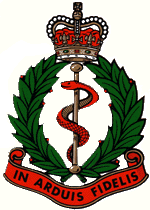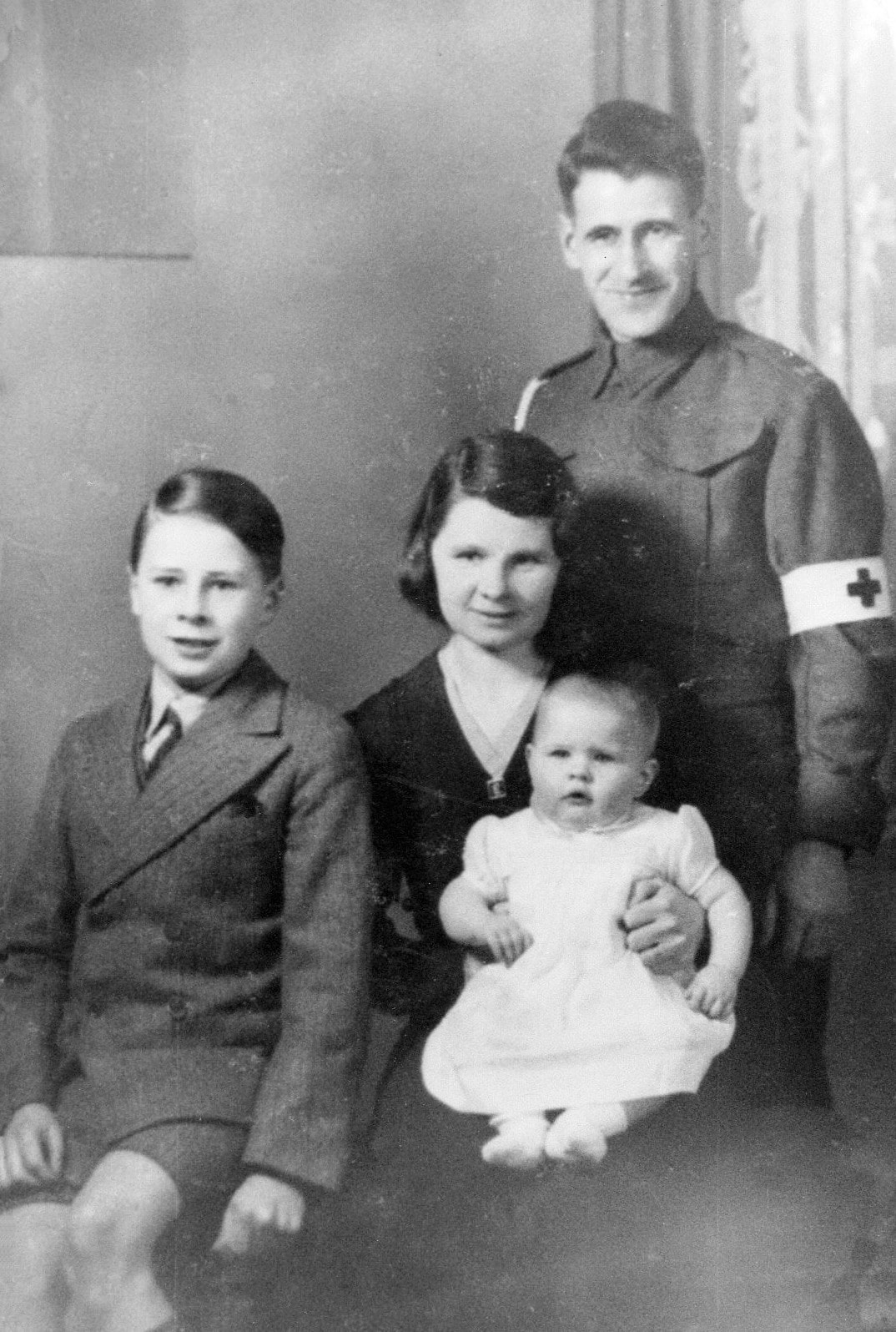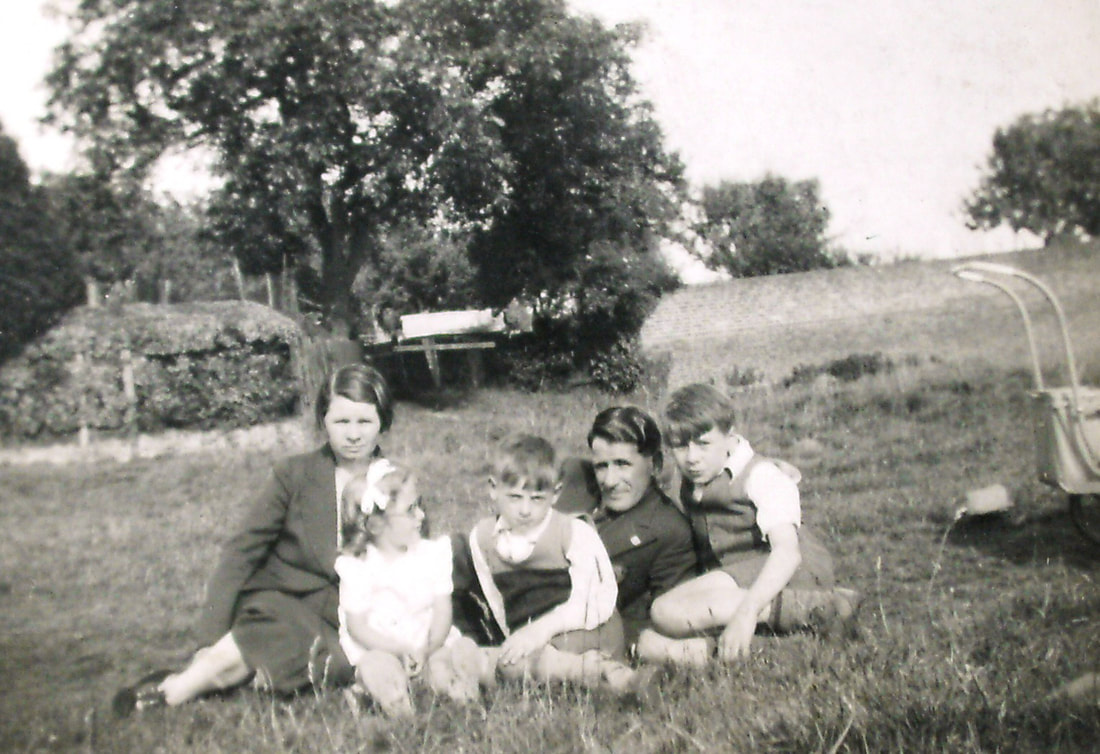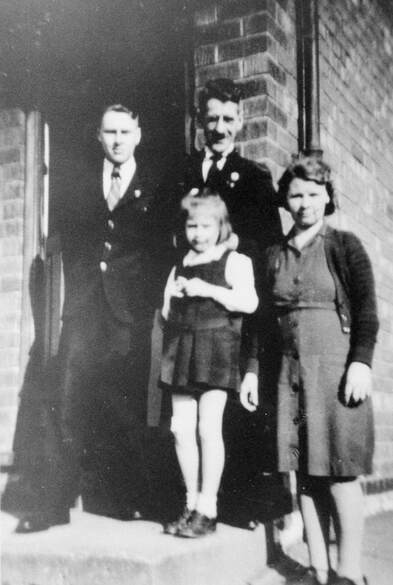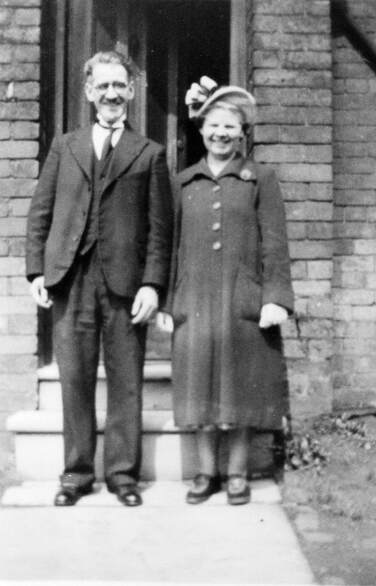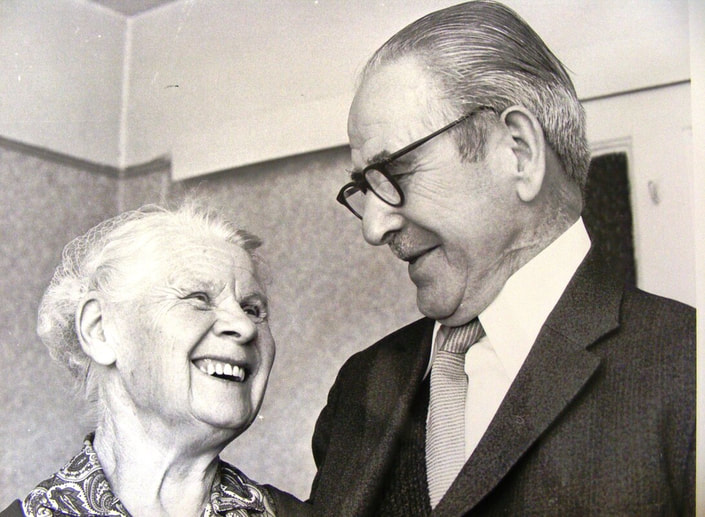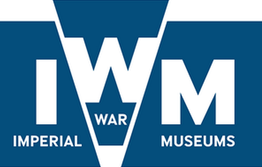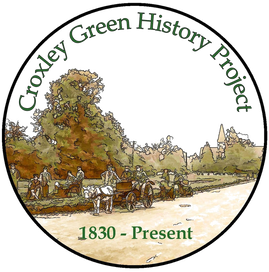Artur Rowland 1902-1982
Arthur was born on 7th. August, 1902, at 6, Perkins Street, Salford, the son of John Rowland and Nellie Rowland, nee O'Donovan.
Arthur and his wife Emma were living in Salford when they married on 9th October 1926. They moved to Norbett Road, Arnold, Nottinghamshire and this was followed by a decision to move to Croxley Green c1938 with their son Donovan aged eleven years. A daughter Norah was born soon after they had settled. Arthur was employed at the local Sun Engraving Printing Company in Whippendell Road, Watford. The 1939 Register, taken on the 29th September to record the location of all UK citizens following the outbreak of World War Two, records that the family were living at 11, Repton Way, Croxley Green.
For some time, Europe had been aware of German armies moving against its neighbours in an attempt to take back territory of which it had lost control following its defeat in WW1. In Britain, in spite of months of appeasement, it had been decided that some preparations should be made for the possibility of another war. As a result, the British Government built many new Army Depots and Barracks across the Country.
Aldershot, had become a military town since the mid 1880’s, and it was now expanding into the nearby villages, including Crookham Church. A new barracks was built in 1938 as a training depot for the Royal Army Medical Corps, (R.A.M.C.) and was originally named Boyce Barracks after Major William Wallace Boyce, D.S.O. It was later renamed Crookham Royal Army Medical Corps Barracks. The wooden-hutted barracks were arranged in the shape of 'spiders' on the campsite and could accommodate 2,500 soldiers.
The R.A.M.C. was originally set up as a medical team of first responders to give First Aid to soldiers who had sustained injuries whilst in conflict with an enemy. They used a special system to assess the sick and wounded soldiers into three different groups according to the care and attention they required to treat them.
On the morning of 3rd September 1939 the United Kingdom issued an ultimatum to Germany to cease invading Poland. In a Radio Broadcast later that morning, Prime Minister Neville Chamberlain announced that as no reply had been received to the ultimatum ‘Britain is at war with Germany’.
Having served as a Private in the Royal Army Medical Corps in the Territorial Army during peacetime, Arthur Rowland had already volunteered to enlist in the army by October 1939. He was thirty seven years old and having had several years army service he was posted to the Crookham Barracks for assessment and possible re-engagement with the R.A.M.C.
Arthur and his wife Emma were living in Salford when they married on 9th October 1926. They moved to Norbett Road, Arnold, Nottinghamshire and this was followed by a decision to move to Croxley Green c1938 with their son Donovan aged eleven years. A daughter Norah was born soon after they had settled. Arthur was employed at the local Sun Engraving Printing Company in Whippendell Road, Watford. The 1939 Register, taken on the 29th September to record the location of all UK citizens following the outbreak of World War Two, records that the family were living at 11, Repton Way, Croxley Green.
For some time, Europe had been aware of German armies moving against its neighbours in an attempt to take back territory of which it had lost control following its defeat in WW1. In Britain, in spite of months of appeasement, it had been decided that some preparations should be made for the possibility of another war. As a result, the British Government built many new Army Depots and Barracks across the Country.
Aldershot, had become a military town since the mid 1880’s, and it was now expanding into the nearby villages, including Crookham Church. A new barracks was built in 1938 as a training depot for the Royal Army Medical Corps, (R.A.M.C.) and was originally named Boyce Barracks after Major William Wallace Boyce, D.S.O. It was later renamed Crookham Royal Army Medical Corps Barracks. The wooden-hutted barracks were arranged in the shape of 'spiders' on the campsite and could accommodate 2,500 soldiers.
The R.A.M.C. was originally set up as a medical team of first responders to give First Aid to soldiers who had sustained injuries whilst in conflict with an enemy. They used a special system to assess the sick and wounded soldiers into three different groups according to the care and attention they required to treat them.
On the morning of 3rd September 1939 the United Kingdom issued an ultimatum to Germany to cease invading Poland. In a Radio Broadcast later that morning, Prime Minister Neville Chamberlain announced that as no reply had been received to the ultimatum ‘Britain is at war with Germany’.
Having served as a Private in the Royal Army Medical Corps in the Territorial Army during peacetime, Arthur Rowland had already volunteered to enlist in the army by October 1939. He was thirty seven years old and having had several years army service he was posted to the Crookham Barracks for assessment and possible re-engagement with the R.A.M.C.
Soon after arriving at the barracks, Arthur began writing the first of many letters to his wife Emma. He describes his initial thoughts of being back serving in the army. In these regular letters to Emma, Arthur was anxious to know everything about his family and how they were coping. His family was very important to him especially his two children. In such a short time living in Croxley Green the family had made many new friends. News of these were also very welcome.
Emma saved these precious letters that Arthur wrote during his wartime services 1939 -1941, and for many years they were kept in a biscuit tin. Following the death of Arthur, his daughter Norah Chown and Norah’s daughter Joan Lightning decided to publish the letters as a lasting memorial to Arthur and Emma. They were transcribed by Norah, edited by Joan and published in 2016 with the title ‘With all my love’.
The Croxley Green History Project (CGHP) has been given permission by the family to use extracts from Arthur’s correspondence which gives an insight into his army experiences as well as how the family was having to cope in unfamiliar circumstances and changes in wartime.
In an early letter to Emma dated 14th October 1939, Arthur revealed the ‘creature comfort’ the barracks had and hinted of their ‘luxury with central heating, hot and cold water for showers or baths, as well as wardrobes’.
Arthur also indicated he had undergone training with parading, that would suggest much drilling and marching was taking place. He had met several men from their home town of Manchester in such a short while. By the end of October Arthur was sent abroad and he asks Emma when she writes in the future to him, to address the envelopes with ‘to be forwarded.’
This was evident by the 28th October when a letter from Arthur is headed 4th General Hospital, c/o Army Post Office. This reveals the significance of how quickly the move to war was progressing in such a short while for Arthur to be posted to a Field Hospital in France.
The 4th General Hospital La Baule, was set up from September 1939 and located on the Brittany coast midway between Vannes and Nantes, and close to the port of Saint -Nazaire. Seriously injured soldiers could be returned to the U.K. for further specialist treatment from this port.
Arthur’s letters to Emma gave no indication of the exact situation that was happening in France as it was important that the contents of letters home should not contain any risky information that even in innocence, could be passed on to the enemy. If this were to happen they could be censored by military personnel.
Emma’s letters to Arthur kept him up to date with the children’s progress, sending photographs as well as information regarding the sensitive relationship between his son Donovan and Doris, an evacuee they had taken into their home. Situated in the countryside and a short distance from London, Croxley Green received several hundred young evacuee children who were sent away from their parents for safe keeping at the outbreak of the war. Emma and Arthur had accepted a school child called Doris, who was of a similar age to Donovan.
There were times when both young children were finding it difficult to live in harmony. Doris, away from her family and possibly for the first time, in a completely new and different environment, and Donovan, missing his father as well as sharing his mother with a stranger, plus a new baby sister Norah, this would have been a strain on everyone.
Emma’s updates to Arthur included news of neighbours and church members as they both attended the Baptist church at Derby Road, Watford. (Donovan was to become a Pastor here in the 1970’s) They also kept in touch with family and friends from Salford, Manchester as well as other parts of the country. The Watford Observer newspaper was also sent out on a regular basis, keeping Arthur up to date with the local news.
Arthur’s regular letters also gave an insight into the shortage of comforts he was missing and asked Emma if she was able to provide him with these. Cigarettes were on the list especially ‘Senior Service’, considered a more expensive brand and not so easily available to him as the cheaper brands he could obtain in France. A pullover that Emma sent pleased Arthur very much, as certain articles and quantity of clothing was in short supply. Arthur’s twin sisters Norah and Nelle, just one year older, sent him a pair of gloves as winter was approaching and they were a very welcome addition.
Arthur’s love for his wife, family and friends is steadfast in every letter. A letter to Emma dated 27.12.39:-
My Darling,
What sort of Christmas have you had? A good one I hope. I got your parcel & the paper quite safely, also one from the girls & one from the ARP & letters from Mr. Houghton, Mr. Norcross & Mr. Carlisle & one from the Army Scripture Readers. We had plenty to do over Xmas & now I have gone on days. The RAMC men had our dinner yesterday & quite a good one too. Soup, Turkey, Ham, Pork &Vegetables, Xmas Pudding & the usual trimmings.
We have a young lady (a nurse) here from the Tabernacle, Mr. Bird sent her my name & she ferreted me out, & one of the orderly’s relatives lives in Croxley just by the Met Station. About those letters you say you send, I only get an average of one a week I am always ready for it too. Nelly tells me St Clements are going down terribly, the Devotional on Saturday nights has been dropped & is held on Sunday afternoon, Mr. Houghton, Miss Osborne & the girls, four, & we used to have originally an average of fifty.
Have you come to terms with Cracknell yet? & have you got the Co-op money?
Now Darling for the New Year read Romans 15-13 & then remember all we have been through together & come out smiling, we can still do the same. May everything be for Him, & every blessing be yours “May the God of Consolation give you all joy and Peace in Believing” Kiss Donnie & Norah for me, I shall look forward to holding Norah in my arms.
Yours in Love
Arthur
Remember me to Framptons (how are they) & all Croxley Friends.
*********************************************
A letter dated 1.1.40 to Emma mentions a recurring problem Arthur has with his neck. As a child
Arthur had tuberculosis resulting with scars on both sides of his neck caused by radium moulds to treat his inflamed glands. The coarse material from his army uniform was beginning to rub and chafe the scars and made them sore. He is thankful for the ointment Norah sent and as a result his neck was showing slight improvement.
Extra clothing was sent to him. Arthur now possessed 3 pullovers, 7 pairs of socks, 2 pairs of gloves, 1 pair of mittens, 1 Balaclava Helmet, 1 knitted scarf and 1 woven scarf (army issue). Even though he is pleased and well equipped for the colder weather with warm clothing, Arthur now has a cold. He has been away from his family for three months and is missing everyone, which is evident in his continued request to have information. He suggested Donovan writes to him as well. Arthur wrote to his son on the 13.1.40
Dear Donovan
Fancy you cracking your crust again, never mind so long as it is getting better.
I was very glad to hear about Norah & how she is learning & I am very pleased that you are mastering simple “electrics” it always comes in useful to know how to do these jobs.
Now study hard for that Exam in March & you will be top again, and show them all what a Lancashire Lad can do.
Give my love to Mother & Norah & take great care of them.
Your Loving
Dad
******************************************************
Arthur is pleased to receive a letter in return from his son and is encouraged to know of the progress he is making and is very complimentary with this reply on 30.1.40.
Dear Donovan
I was very glad to get your letter & to know you had taken up First Aid, you will be very pleased to know it later on. Now about the bandages, you can use any including the Triangular Bandages in the wrapper provided you get Mum to wash it & put it away clean again, that is a special one. I am hoping to hear that you are doing well, & be somewhere near the top.
How is your head going on? You must not teach Norah to knock herself about, & how is school going on these days, still near the top? You must teach Norah how to talk properly, Mum says she can say “Mum” & “Dada” she must be a bonnie girl now. Now laddie in your interest in First Aid don’t forget your Bible or your prayers & God will Bless you.
Your Loving
Dad
XXXXXXXXXXXXXXXX
Tell your Captain & Mr. Parker & Mr. Dimmond I often think about them & wonder how they are.
Perhaps Mum could make another triangular Bandage if she has a piece of Calico big enough & can spare it.
**************************************************
More letters pass between Emma and Arthur who is also catching up with friends from Croxley Green and their wider group of friends and family. He comments about how long it takes for parcels and post to reach him from Croxley Green, taking eleven days whereas others were reaching him in four days! Either times seems quite remarkable for letters etc to reach their destination in a continuous flow which does show the importance to the morale of people working on the Front Line in anxious and uncertain circumstances.
2.4.40
Bravo Donovan
Top of the Class, First Class in Scripture, now for the Hat Trick, what about the Brigade. I am especially pleased with the Scripture exam, always remember you cannot know enough about the “Book of Books”. “This book will keep you from Sin, or Sin will keep you from this Book”. Above all learn from Him who is the Author (as well as about Him).
How is the First Aid going? Have you got your badge yet?
Mother tells me Joey is staying till the end of the War, there is a good chance to learn more by teaching him your Bible.
Tell Mother I cannot find that photo I may have left it, either in the suitcase or my old desk.
Now Laddie look after your baby sister & your Mother for me & not too much strong arm stuff with Joey.
Love from your Affectionate
Daddy
(Note -Joey was Emma’s nephew)
*****************************************************
It would appear from the previous letter and the following one, that Arthur came home on leave for nine days and there was an opportunity to have memorable photographs taken.
Emma saved these precious letters that Arthur wrote during his wartime services 1939 -1941, and for many years they were kept in a biscuit tin. Following the death of Arthur, his daughter Norah Chown and Norah’s daughter Joan Lightning decided to publish the letters as a lasting memorial to Arthur and Emma. They were transcribed by Norah, edited by Joan and published in 2016 with the title ‘With all my love’.
The Croxley Green History Project (CGHP) has been given permission by the family to use extracts from Arthur’s correspondence which gives an insight into his army experiences as well as how the family was having to cope in unfamiliar circumstances and changes in wartime.
In an early letter to Emma dated 14th October 1939, Arthur revealed the ‘creature comfort’ the barracks had and hinted of their ‘luxury with central heating, hot and cold water for showers or baths, as well as wardrobes’.
Arthur also indicated he had undergone training with parading, that would suggest much drilling and marching was taking place. He had met several men from their home town of Manchester in such a short while. By the end of October Arthur was sent abroad and he asks Emma when she writes in the future to him, to address the envelopes with ‘to be forwarded.’
This was evident by the 28th October when a letter from Arthur is headed 4th General Hospital, c/o Army Post Office. This reveals the significance of how quickly the move to war was progressing in such a short while for Arthur to be posted to a Field Hospital in France.
The 4th General Hospital La Baule, was set up from September 1939 and located on the Brittany coast midway between Vannes and Nantes, and close to the port of Saint -Nazaire. Seriously injured soldiers could be returned to the U.K. for further specialist treatment from this port.
Arthur’s letters to Emma gave no indication of the exact situation that was happening in France as it was important that the contents of letters home should not contain any risky information that even in innocence, could be passed on to the enemy. If this were to happen they could be censored by military personnel.
Emma’s letters to Arthur kept him up to date with the children’s progress, sending photographs as well as information regarding the sensitive relationship between his son Donovan and Doris, an evacuee they had taken into their home. Situated in the countryside and a short distance from London, Croxley Green received several hundred young evacuee children who were sent away from their parents for safe keeping at the outbreak of the war. Emma and Arthur had accepted a school child called Doris, who was of a similar age to Donovan.
There were times when both young children were finding it difficult to live in harmony. Doris, away from her family and possibly for the first time, in a completely new and different environment, and Donovan, missing his father as well as sharing his mother with a stranger, plus a new baby sister Norah, this would have been a strain on everyone.
Emma’s updates to Arthur included news of neighbours and church members as they both attended the Baptist church at Derby Road, Watford. (Donovan was to become a Pastor here in the 1970’s) They also kept in touch with family and friends from Salford, Manchester as well as other parts of the country. The Watford Observer newspaper was also sent out on a regular basis, keeping Arthur up to date with the local news.
Arthur’s regular letters also gave an insight into the shortage of comforts he was missing and asked Emma if she was able to provide him with these. Cigarettes were on the list especially ‘Senior Service’, considered a more expensive brand and not so easily available to him as the cheaper brands he could obtain in France. A pullover that Emma sent pleased Arthur very much, as certain articles and quantity of clothing was in short supply. Arthur’s twin sisters Norah and Nelle, just one year older, sent him a pair of gloves as winter was approaching and they were a very welcome addition.
Arthur’s love for his wife, family and friends is steadfast in every letter. A letter to Emma dated 27.12.39:-
My Darling,
What sort of Christmas have you had? A good one I hope. I got your parcel & the paper quite safely, also one from the girls & one from the ARP & letters from Mr. Houghton, Mr. Norcross & Mr. Carlisle & one from the Army Scripture Readers. We had plenty to do over Xmas & now I have gone on days. The RAMC men had our dinner yesterday & quite a good one too. Soup, Turkey, Ham, Pork &Vegetables, Xmas Pudding & the usual trimmings.
We have a young lady (a nurse) here from the Tabernacle, Mr. Bird sent her my name & she ferreted me out, & one of the orderly’s relatives lives in Croxley just by the Met Station. About those letters you say you send, I only get an average of one a week I am always ready for it too. Nelly tells me St Clements are going down terribly, the Devotional on Saturday nights has been dropped & is held on Sunday afternoon, Mr. Houghton, Miss Osborne & the girls, four, & we used to have originally an average of fifty.
Have you come to terms with Cracknell yet? & have you got the Co-op money?
Now Darling for the New Year read Romans 15-13 & then remember all we have been through together & come out smiling, we can still do the same. May everything be for Him, & every blessing be yours “May the God of Consolation give you all joy and Peace in Believing” Kiss Donnie & Norah for me, I shall look forward to holding Norah in my arms.
Yours in Love
Arthur
Remember me to Framptons (how are they) & all Croxley Friends.
*********************************************
A letter dated 1.1.40 to Emma mentions a recurring problem Arthur has with his neck. As a child
Arthur had tuberculosis resulting with scars on both sides of his neck caused by radium moulds to treat his inflamed glands. The coarse material from his army uniform was beginning to rub and chafe the scars and made them sore. He is thankful for the ointment Norah sent and as a result his neck was showing slight improvement.
Extra clothing was sent to him. Arthur now possessed 3 pullovers, 7 pairs of socks, 2 pairs of gloves, 1 pair of mittens, 1 Balaclava Helmet, 1 knitted scarf and 1 woven scarf (army issue). Even though he is pleased and well equipped for the colder weather with warm clothing, Arthur now has a cold. He has been away from his family for three months and is missing everyone, which is evident in his continued request to have information. He suggested Donovan writes to him as well. Arthur wrote to his son on the 13.1.40
Dear Donovan
Fancy you cracking your crust again, never mind so long as it is getting better.
I was very glad to hear about Norah & how she is learning & I am very pleased that you are mastering simple “electrics” it always comes in useful to know how to do these jobs.
Now study hard for that Exam in March & you will be top again, and show them all what a Lancashire Lad can do.
Give my love to Mother & Norah & take great care of them.
Your Loving
Dad
******************************************************
Arthur is pleased to receive a letter in return from his son and is encouraged to know of the progress he is making and is very complimentary with this reply on 30.1.40.
Dear Donovan
I was very glad to get your letter & to know you had taken up First Aid, you will be very pleased to know it later on. Now about the bandages, you can use any including the Triangular Bandages in the wrapper provided you get Mum to wash it & put it away clean again, that is a special one. I am hoping to hear that you are doing well, & be somewhere near the top.
How is your head going on? You must not teach Norah to knock herself about, & how is school going on these days, still near the top? You must teach Norah how to talk properly, Mum says she can say “Mum” & “Dada” she must be a bonnie girl now. Now laddie in your interest in First Aid don’t forget your Bible or your prayers & God will Bless you.
Your Loving
Dad
XXXXXXXXXXXXXXXX
Tell your Captain & Mr. Parker & Mr. Dimmond I often think about them & wonder how they are.
Perhaps Mum could make another triangular Bandage if she has a piece of Calico big enough & can spare it.
**************************************************
More letters pass between Emma and Arthur who is also catching up with friends from Croxley Green and their wider group of friends and family. He comments about how long it takes for parcels and post to reach him from Croxley Green, taking eleven days whereas others were reaching him in four days! Either times seems quite remarkable for letters etc to reach their destination in a continuous flow which does show the importance to the morale of people working on the Front Line in anxious and uncertain circumstances.
2.4.40
Bravo Donovan
Top of the Class, First Class in Scripture, now for the Hat Trick, what about the Brigade. I am especially pleased with the Scripture exam, always remember you cannot know enough about the “Book of Books”. “This book will keep you from Sin, or Sin will keep you from this Book”. Above all learn from Him who is the Author (as well as about Him).
How is the First Aid going? Have you got your badge yet?
Mother tells me Joey is staying till the end of the War, there is a good chance to learn more by teaching him your Bible.
Tell Mother I cannot find that photo I may have left it, either in the suitcase or my old desk.
Now Laddie look after your baby sister & your Mother for me & not too much strong arm stuff with Joey.
Love from your Affectionate
Daddy
(Note -Joey was Emma’s nephew)
*****************************************************
It would appear from the previous letter and the following one, that Arthur came home on leave for nine days and there was an opportunity to have memorable photographs taken.
15-4-40
My own Darling
I got your Welcome letter & photo safely & very welcome news it was too, first for your sweet self & then for Donovan. I hope he will be quite OK by the time you get this. I need hardly say Darling no one will be more pleased than to be home again for good, to hold you in my arms & to look after you and my babes again. The photo is such a good one of you all, I am proud of you all. I wonder what your thoughts are of tonight, it seems so unreal to me, since I have been back. I can’t seem to settle, the few days are lived over and over again, yet this Hospital experience I shall never forget. We have just got a new patient whose home is in Rolvenden in Kent, knew our Katie and her family well till they Removed. Also we have got a new C of E Padre quite a young chap, 6ft Odd tall, pal of Ridlers.
Well my Sweetheart Good night, excuse pencil, it’s quicker to write with. May God Bless you & hasten our meeting for good.
Yours Arthur
XXXXXXXXXXXXXXXXXXXXXXXXX
(Note – Katie was Arthur’s half-sister)
***************************************************************
Returning to his unit in France Arthur’s skin has improved to his neck but unfortunately it soon deteriorates as Arthur has to wear his Battle dress uniform again.
As the year progressed the German armies were steadily advancing throughout France and the Allied troops were losing control of the country. A huge logistical evacuation was required. It was imperative to get as many troops as possible back to England. Between the end of May and the 4th June 1940, Dunkirk and Northern France saw thousands of Allied troops saved by the united efforts of hundreds of small boats and ships from England repeatedly making the hazardous journey back and forth. However, many thousands were also lost.
Saint-Nazaire, the port in a more southerly area of France, close by to the hospital where Arthur was serving, was also identified as an evacuation point for troops and civilians back to England. It was high risk and a dangerous journey requiring larger vessels. Two weeks after the Dunkirk rescue, on 17th June 1940 at Saint- Nazaire, an estimated 9,000 people including British Army soldiers and civilians including women and children embarked aboard the Clyde-built cruise liner, RMS Lancastria, (a Royal Mail Ship that had been converted to a troopship). The evacuation from here included those who were patients and would have been an unimaginable task. It was attacked and sunk by German Junker 88 bomber aircraft. Approximately 4,000 victims, including men, women and children, lost their lives.
This was the worst disaster in British maritime history and the worst loss of life for British forces in the whole of World War II. Winston Churchill, on learning of it, banned all news coverage of the disaster and it remained largely forgotten by history for many years. However, the ship Arthur was on arrives safely back to England.
In a hurried postcard dated 21st June to Emma after arriving back in England, Arthur describes the temporary accommodation at Becketts Park, part of the Leeds University. He is saddened that having to depart so quickly from France, all his possessions were left behind including his Bible and some of the precious gifts he had received. The medical staff regretted they had to leave much of their valuable equipment.
Arthur’s letters continue updating Emma as well as noting his company have organised and arranged facilities in a local school for them to have their meals. His breakfast is adequate but size could be improved, porridge followed by kippers, two slices of bread, margarine, marmalade and tea. However, it would seem supper was not included and chips were a firm favourite as a stop gap. He is hopeful that he may soon be allowed home on leave in September
The problems Arthur has been experiencing with his neck has now become critical and he has been referred to the Dermatologist Unit at Leeds & General Hospital. The outcome of his appointment is a recommendation to Sir Harold Gillies, Chief Army Plastic Surgical Unit. This requires approval and Arthur is further examined with regard to his initial treatment with radium.
The soldiers were eventually billeted in several homes nearby to the university in Kirkstall, Leeds. Whilst they were receiving adequate meals, rationing was now underway in the United Kingdom. Supplies of much needed food came from Canada and the USA but this was proving difficult because of the journey across the North Atlantic. German submarines were making the sinking of these ships en route to the United Kingdom a priority .
There appears to be a longer time lapse between letters from Arthur, so it is possible he had had some leave.
Meanwhile, Croxley Green was experiencing local air raid warnings from German attacks, particularly on the 25th September 1940 when a Parachute bomb fell near All Saints church.
Croxley Green History - Second World War 1939-1945 - Croxley Green History Project
Arthur received news that he had been recommended for plastic surgery and it that it is essential to prevent any further problems. Arthur was admitted on 2nd October 1940 to Ward 21, St James Hospital, Beckett Street, Leeds, for treatment with eventual skin grafts to both sides of his neck.
Meanwhile his unit has moved to the Midlands.
Coincidently, as part of the initial stages to the procedures Arthur was to undergo, one was on his wedding anniversary 9th October. He explains to Emma how chronic and uncomfortable his condition is.
As described by Joan Lightning, Arthur’s granddaughter in the book:-
Arthur’s skin graft treatment involved the walking-stalk skin flap (also called waltzing tube pedicle) invented by Harold Gillies and developed by Archibald McIndoe. How he managed to write his letters is a mystery- he was right-handed despite his right arm being slightly crooked)
His stay in hospital was very successful and he was well cared for by the nursing staff. Meals were a great talking point with tea being welcome, fruit salad and bananas and green salad and cold chicken. The staff have high praise for the R.A.M.C.
Even though Arthur is undergoing very serious surgery he still manages to write eloquent loving letters to ‘the mother of my children & the sweetest girl in the world’. Emma still finds it possible to send Arthur special parcels including biscuits and cheese, which he is delighted to receive.
After being in hospital for over one month the skin graft on the right side of Arthur’s neck is successful and a different technique was applied to the left side. Convalescence was expected but Arthur was hopeful a visit from Emma would be possible prior to this. He is pleased to know she will make the journey and sends her a detailed letter 19.11.40 with suggestions for her travelling arrangements.
If you get the 8-0am from Croxley Met to Baker St. You had better walk to Kings Cross it is only 10 minutes. Coming out of Baker St. Station turn sharp left & straight down the road & Kings Cross is on the left hand side. You can go by tube, but you will find they are rather crowded. Tube Baker St. To Piccadilly then change Piccadilly to Kings Cross. Sorry it is 10 minutes to Euston from Kings X. Perhaps the best way if you have Norah is to get a taxi, it will be about 1/6 – 2/-,I have been trying to think it maybe 20 minutes or more to Baker St. To Kings X. The train for Leeds is up on the left hand side of the Station, & it is 10am thereabouts, get well up the Platform to the front of the train & it comes straight through, when you get to Leeds, if there is no-one to meet you, come out of the Station turn to the right & walk to the Corn Exchange,(about 7 minutes) and get a number 11 Car from there (1 1/2d) & it Puts you down at the Lodge gates. Ask for St James Hospital. The Corn Exchange is on a straight road from the Station & has a bit of a square in front with an island on where the cars stop, & the place for the queue Becket St is marked. The first square you reach from the station is City Square(with a statue of the Black Knight) go straight on. If you decide to tube from Baker St. to Kings X you must not be afraid of the crowd, once you get on the tube platform all the trains on that Platform go your way & they Pack as many in each train as possible. It is about 3 Stations from Baker St. to Piccadilly & 3 more to Kings X. The change at Piccadilly is worse up an escalator through Corridors, & round corners. I think you would be well advised because of Norah to have a taxi.
Arthur is expecting Emma to visit him the following week and sends her 10/- (ten shillings about £20 in today’s money) the following day towards her expenses.
The journey for Emma would have had some daunting times for her, as London was under attack with The Blitz bombing. Certainly Baker St. and Kings X area would have been targeted although the East End of London was more severely bombed. Coming from Croxley Green where many properties at the top of Scots Hill had been demolished in September, it must have been very frightening to see the devastation.
The actual visit must have been a success. In his letter on the 2nd December Arthur extols how taken with Norah everyone was. Over the next six months Arthur is still in hospital with his recovery making slow progress. The stitches in his neck were eventually removed and the Surgeon was very pleased. Arthur mentions the difference in the tanned skin of his neck and the pink piece if skin that has been grafted in. In a letter of 4th May he mentions that Sir Harold Gillies* had been to see him recently.
Arthur does manage to make social visits to various acquaintances in Kirkstall as well as assisting in the ward. He is, as expected, limited in the use of his arms and shoulders due to the nature of the procedure, taking and growing skin in that area to graft to his neck. The Radiologist comments that Arthur’s grafts are among the best he has seen.
Letters flow back and forth from Emma and Arthur as well as from his family in Manchester. Arthur is sent many parcels including sugar for his sweet tooth and cigarettes.
Arthur’s progress means he was moved to Ward 7 in The Ministry of Pensions Hospital, Chapel Allerton,** in May 1941. He is hopeful he can ask Emma to send his civilian clothes, the same month just in case he gets discharged. These are to be sent to one of his landladies, Mrs Lawson, 11 Morris Grove, Kirkstall.
Eventually, Arthur hears the news that he can go home to Croxley Green in June 1941 and the correspondence then comes to an end.
The family moved later that year to Leicester, and although Arthur was no longer able to serve in the army he soon volunteered for the A.R.P. (Air Raid Precaution as part of the Civil Defence)
The after effects of the plastic surgery left Arthur with limited mobility to his arms for the remainder of his life. Following two years in Leicester the family moved to Norbett Road, Arnold, Nottingham, in 1943. In later life, Donovan became a pastor and Norah became a nurse. Emma born 5th March 1901 passed away in 1980 and Arthur 1982.
My own Darling
I got your Welcome letter & photo safely & very welcome news it was too, first for your sweet self & then for Donovan. I hope he will be quite OK by the time you get this. I need hardly say Darling no one will be more pleased than to be home again for good, to hold you in my arms & to look after you and my babes again. The photo is such a good one of you all, I am proud of you all. I wonder what your thoughts are of tonight, it seems so unreal to me, since I have been back. I can’t seem to settle, the few days are lived over and over again, yet this Hospital experience I shall never forget. We have just got a new patient whose home is in Rolvenden in Kent, knew our Katie and her family well till they Removed. Also we have got a new C of E Padre quite a young chap, 6ft Odd tall, pal of Ridlers.
Well my Sweetheart Good night, excuse pencil, it’s quicker to write with. May God Bless you & hasten our meeting for good.
Yours Arthur
XXXXXXXXXXXXXXXXXXXXXXXXX
(Note – Katie was Arthur’s half-sister)
***************************************************************
Returning to his unit in France Arthur’s skin has improved to his neck but unfortunately it soon deteriorates as Arthur has to wear his Battle dress uniform again.
As the year progressed the German armies were steadily advancing throughout France and the Allied troops were losing control of the country. A huge logistical evacuation was required. It was imperative to get as many troops as possible back to England. Between the end of May and the 4th June 1940, Dunkirk and Northern France saw thousands of Allied troops saved by the united efforts of hundreds of small boats and ships from England repeatedly making the hazardous journey back and forth. However, many thousands were also lost.
Saint-Nazaire, the port in a more southerly area of France, close by to the hospital where Arthur was serving, was also identified as an evacuation point for troops and civilians back to England. It was high risk and a dangerous journey requiring larger vessels. Two weeks after the Dunkirk rescue, on 17th June 1940 at Saint- Nazaire, an estimated 9,000 people including British Army soldiers and civilians including women and children embarked aboard the Clyde-built cruise liner, RMS Lancastria, (a Royal Mail Ship that had been converted to a troopship). The evacuation from here included those who were patients and would have been an unimaginable task. It was attacked and sunk by German Junker 88 bomber aircraft. Approximately 4,000 victims, including men, women and children, lost their lives.
This was the worst disaster in British maritime history and the worst loss of life for British forces in the whole of World War II. Winston Churchill, on learning of it, banned all news coverage of the disaster and it remained largely forgotten by history for many years. However, the ship Arthur was on arrives safely back to England.
In a hurried postcard dated 21st June to Emma after arriving back in England, Arthur describes the temporary accommodation at Becketts Park, part of the Leeds University. He is saddened that having to depart so quickly from France, all his possessions were left behind including his Bible and some of the precious gifts he had received. The medical staff regretted they had to leave much of their valuable equipment.
Arthur’s letters continue updating Emma as well as noting his company have organised and arranged facilities in a local school for them to have their meals. His breakfast is adequate but size could be improved, porridge followed by kippers, two slices of bread, margarine, marmalade and tea. However, it would seem supper was not included and chips were a firm favourite as a stop gap. He is hopeful that he may soon be allowed home on leave in September
The problems Arthur has been experiencing with his neck has now become critical and he has been referred to the Dermatologist Unit at Leeds & General Hospital. The outcome of his appointment is a recommendation to Sir Harold Gillies, Chief Army Plastic Surgical Unit. This requires approval and Arthur is further examined with regard to his initial treatment with radium.
The soldiers were eventually billeted in several homes nearby to the university in Kirkstall, Leeds. Whilst they were receiving adequate meals, rationing was now underway in the United Kingdom. Supplies of much needed food came from Canada and the USA but this was proving difficult because of the journey across the North Atlantic. German submarines were making the sinking of these ships en route to the United Kingdom a priority .
There appears to be a longer time lapse between letters from Arthur, so it is possible he had had some leave.
Meanwhile, Croxley Green was experiencing local air raid warnings from German attacks, particularly on the 25th September 1940 when a Parachute bomb fell near All Saints church.
Croxley Green History - Second World War 1939-1945 - Croxley Green History Project
Arthur received news that he had been recommended for plastic surgery and it that it is essential to prevent any further problems. Arthur was admitted on 2nd October 1940 to Ward 21, St James Hospital, Beckett Street, Leeds, for treatment with eventual skin grafts to both sides of his neck.
Meanwhile his unit has moved to the Midlands.
Coincidently, as part of the initial stages to the procedures Arthur was to undergo, one was on his wedding anniversary 9th October. He explains to Emma how chronic and uncomfortable his condition is.
As described by Joan Lightning, Arthur’s granddaughter in the book:-
Arthur’s skin graft treatment involved the walking-stalk skin flap (also called waltzing tube pedicle) invented by Harold Gillies and developed by Archibald McIndoe. How he managed to write his letters is a mystery- he was right-handed despite his right arm being slightly crooked)
His stay in hospital was very successful and he was well cared for by the nursing staff. Meals were a great talking point with tea being welcome, fruit salad and bananas and green salad and cold chicken. The staff have high praise for the R.A.M.C.
Even though Arthur is undergoing very serious surgery he still manages to write eloquent loving letters to ‘the mother of my children & the sweetest girl in the world’. Emma still finds it possible to send Arthur special parcels including biscuits and cheese, which he is delighted to receive.
After being in hospital for over one month the skin graft on the right side of Arthur’s neck is successful and a different technique was applied to the left side. Convalescence was expected but Arthur was hopeful a visit from Emma would be possible prior to this. He is pleased to know she will make the journey and sends her a detailed letter 19.11.40 with suggestions for her travelling arrangements.
If you get the 8-0am from Croxley Met to Baker St. You had better walk to Kings Cross it is only 10 minutes. Coming out of Baker St. Station turn sharp left & straight down the road & Kings Cross is on the left hand side. You can go by tube, but you will find they are rather crowded. Tube Baker St. To Piccadilly then change Piccadilly to Kings Cross. Sorry it is 10 minutes to Euston from Kings X. Perhaps the best way if you have Norah is to get a taxi, it will be about 1/6 – 2/-,I have been trying to think it maybe 20 minutes or more to Baker St. To Kings X. The train for Leeds is up on the left hand side of the Station, & it is 10am thereabouts, get well up the Platform to the front of the train & it comes straight through, when you get to Leeds, if there is no-one to meet you, come out of the Station turn to the right & walk to the Corn Exchange,(about 7 minutes) and get a number 11 Car from there (1 1/2d) & it Puts you down at the Lodge gates. Ask for St James Hospital. The Corn Exchange is on a straight road from the Station & has a bit of a square in front with an island on where the cars stop, & the place for the queue Becket St is marked. The first square you reach from the station is City Square(with a statue of the Black Knight) go straight on. If you decide to tube from Baker St. to Kings X you must not be afraid of the crowd, once you get on the tube platform all the trains on that Platform go your way & they Pack as many in each train as possible. It is about 3 Stations from Baker St. to Piccadilly & 3 more to Kings X. The change at Piccadilly is worse up an escalator through Corridors, & round corners. I think you would be well advised because of Norah to have a taxi.
Arthur is expecting Emma to visit him the following week and sends her 10/- (ten shillings about £20 in today’s money) the following day towards her expenses.
The journey for Emma would have had some daunting times for her, as London was under attack with The Blitz bombing. Certainly Baker St. and Kings X area would have been targeted although the East End of London was more severely bombed. Coming from Croxley Green where many properties at the top of Scots Hill had been demolished in September, it must have been very frightening to see the devastation.
The actual visit must have been a success. In his letter on the 2nd December Arthur extols how taken with Norah everyone was. Over the next six months Arthur is still in hospital with his recovery making slow progress. The stitches in his neck were eventually removed and the Surgeon was very pleased. Arthur mentions the difference in the tanned skin of his neck and the pink piece if skin that has been grafted in. In a letter of 4th May he mentions that Sir Harold Gillies* had been to see him recently.
Arthur does manage to make social visits to various acquaintances in Kirkstall as well as assisting in the ward. He is, as expected, limited in the use of his arms and shoulders due to the nature of the procedure, taking and growing skin in that area to graft to his neck. The Radiologist comments that Arthur’s grafts are among the best he has seen.
Letters flow back and forth from Emma and Arthur as well as from his family in Manchester. Arthur is sent many parcels including sugar for his sweet tooth and cigarettes.
Arthur’s progress means he was moved to Ward 7 in The Ministry of Pensions Hospital, Chapel Allerton,** in May 1941. He is hopeful he can ask Emma to send his civilian clothes, the same month just in case he gets discharged. These are to be sent to one of his landladies, Mrs Lawson, 11 Morris Grove, Kirkstall.
Eventually, Arthur hears the news that he can go home to Croxley Green in June 1941 and the correspondence then comes to an end.
The family moved later that year to Leicester, and although Arthur was no longer able to serve in the army he soon volunteered for the A.R.P. (Air Raid Precaution as part of the Civil Defence)
The after effects of the plastic surgery left Arthur with limited mobility to his arms for the remainder of his life. Following two years in Leicester the family moved to Norbett Road, Arnold, Nottingham, in 1943. In later life, Donovan became a pastor and Norah became a nurse. Emma born 5th March 1901 passed away in 1980 and Arthur 1982.
Donovan became a pastor and Norah became a nurse. Emma passed away in 1980 and Arthur 1982.
Taken from 'With All My Love' Letters home between 1939 and 1941, written home by Arthur Rowland, a medical corpsman, to his wife Emma.
Transcribed by Norah Chown, Edited by Joan Lightning ISBN <978-1-326-86847-5> Published by P J Lightning, Bedfordshire, U.K.
* Harold Delf Gillies was born in New Zealand and came to England and studied medicine at Gonville and Caius College Cambridge. He became a skilled physician trained in the medical and surgical care of head and neck disorders. As an otolaryngologist he created methods to perform modern plastic surgery. Following the outbreak of WW1 he joined the Royal Army Medical Corps and during the course of the war Gillies and his colleagues developed many techniques in plastic surgery.Using similar techniques, this advancement led to Sir Archibald McIndoe performing reconstructive surgery on R.A.F. pilots who had been severely burned and were disfigured during WW2. The Guinea Pig Club for such men was established in 1941. It was a social club with a mutual support network for British and Allied aircrew. This initial experimental surgery was carried out at Queen Victoria Hospital, East Grinstead. https://www.rafbf.org/guinea-pig-club
**Chapel Allerton Hospital where Arthur was finally sent, was originally set up by the Ministry of Pensions to meet the needs of thousands of limbless service personnel who suffered grievous wounds in the trenches in WW1.
Transcribed by Norah Chown, Edited by Joan Lightning ISBN <978-1-326-86847-5> Published by P J Lightning, Bedfordshire, U.K.
* Harold Delf Gillies was born in New Zealand and came to England and studied medicine at Gonville and Caius College Cambridge. He became a skilled physician trained in the medical and surgical care of head and neck disorders. As an otolaryngologist he created methods to perform modern plastic surgery. Following the outbreak of WW1 he joined the Royal Army Medical Corps and during the course of the war Gillies and his colleagues developed many techniques in plastic surgery.Using similar techniques, this advancement led to Sir Archibald McIndoe performing reconstructive surgery on R.A.F. pilots who had been severely burned and were disfigured during WW2. The Guinea Pig Club for such men was established in 1941. It was a social club with a mutual support network for British and Allied aircrew. This initial experimental surgery was carried out at Queen Victoria Hospital, East Grinstead. https://www.rafbf.org/guinea-pig-club
**Chapel Allerton Hospital where Arthur was finally sent, was originally set up by the Ministry of Pensions to meet the needs of thousands of limbless service personnel who suffered grievous wounds in the trenches in WW1.

